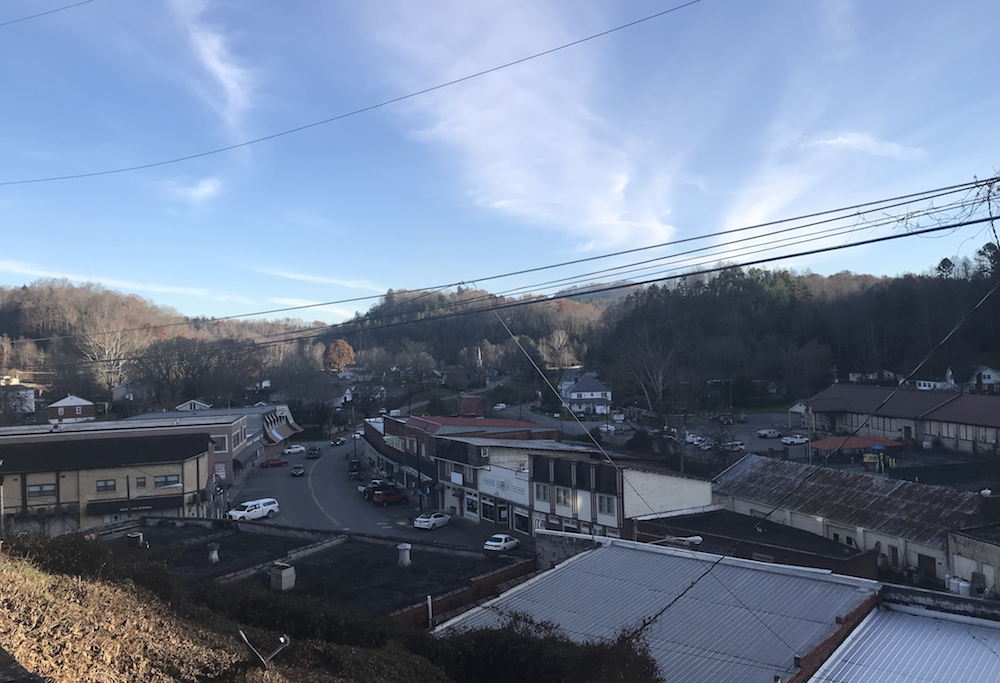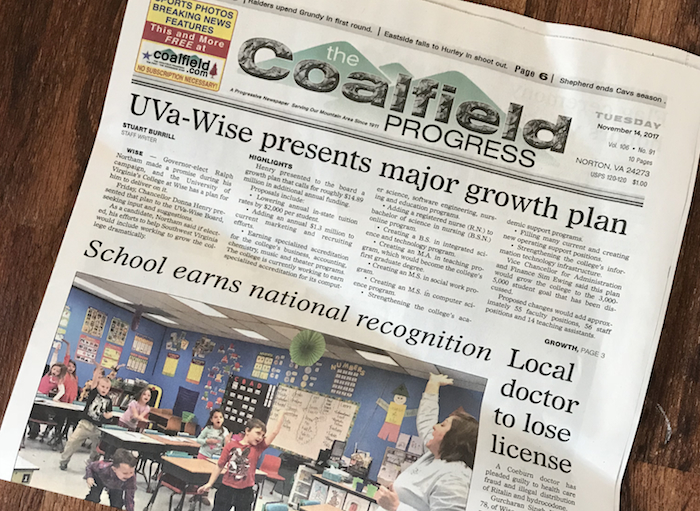Report by Meghan Moore-Hubbard
Code-Switching in Appalachia

In the community where I grew up, the newspaper is the Coalfield Progress. It still puts out two issues a week, and locals just call it “The Coalfield.” I don’t remember my parents reading or subscribing to the paper, but my grandparents did. I never thought much about its name until I moved farther up into Virginia. When asked where I was from, I’d answer, almost automatically, “far southwestern Virginia, down in the coalfields.” That answer summed up so much about my place and the weight I carried about people back home.
I left coal country several years ago, hoping to return once I finished with graduate school, but the longer I stayed away, the easier it was to continue to do so. Soon, I made a conscious effort to hide my accent. In central Appalachia, long i’s are really not long at all. Words like bright, like, and white take extra consideration on my part before I say them aloud. I was intimidated enough entering graduate school at Radford University, which draws students from all over the state of Virginia. Despite my relative proximity to home (three hours by car), I knew how easily my arguments would be dismissed if I sounded ignorant.
Now, I code-switch. When I go home to Wise County, my i’s are blunt and my grammar poor; it's expected. But when I’m in front of a classroom of students where I now teach in Asheville, North Carolina, I make my i’s extra long. I have the same fear that I did in graduate school—that my students won’t take me seriously if I don’t hide my accent. Regardless, they often point it out when I’m tired or frustrated, whenever my pronunciation slips and my accent shines through.
My worlds collided at a conference in Norfolk, Virginia, a couple of years ago. After I presented a lesson plan for social studies teachers on the danger of student stereotyping, I ran into an acquaintance from back home who’d heard me speak. He said, "You don't sound like you used to."
And the truth is, I don’t. I still live in these mountains, only now I’m drawn to more progressive places like Asheville. That’s how I live with myself and all the contradictions of both loving and leaving where I’m from: I’m within the region, but a safe enough distance not to feel the weight of the coalfields.
When I write about home, I often refer to Night Comes to the Cumberlands: A Biography of a Depressed Area by Harry Caudill. This is the 1963 book that got Robert Kennedy and others to tour the region during the War on Poverty. Appalachia means many things to many people, but in geographic terms, it is “a 205,000-square-mile region that follows the spine of the Appalachian Mountains from southern New York to northern Mississippi,” according to the Appalachian Regional Commission.
Central Appalachia is home to the coalfields as well as a history of extreme rural poverty. Night Comes to the Cumberlands focuses on eastern Kentucky and the Cumberland Plateau, neighboring the coalfields of southwestern Virginia, and its settlement through about 1960. In a postscript about the state of the region in 1963, Caudill wrote:
Exhaustion is apparent on every hand—exhaustion of soil, exhaustion of men, exhaustion of hopes. Weariness and lethargy have settled closer everywhere. Nor has a single symptom of improvement manifested itself. The nation—engulfed in its money-making and international politics—has paid no noticeable heed to its darkest area.
I’ve always felt his title suggests that night is not a temporary condition for Appalachians. The dark is what makes us. My grandfather worked 32 years in low coal, spending his days and nights literally in the dark.
Even more than fifty years after Caudill wrote about our depressed area, my hometown still struggles to combat poverty and the stereotypes that accompany it. The Virginia Employment Commission’s “Community Profile” for Wise County indicates that our largest employer is the public school system. Prisons have replaced mines as the employer-at-large (also among the top six is a local grocery store chain). Two of the top-five employers are state penitentiaries—one of which employs my father, a former public school employee. The answer to diversification in our economy? Darkness again, this time in the form of confinement.
I attended a writer’s conference last year in Roanoke where one of the sessions was titled “The Gothic South.” Many of the presenters talked about Southern writers grappling with their conscience and the legacy of the Old South, which isn't (and maybe never was) the picture portrayed in Gone with the Wind. The romantic antebellum lifestyle evoked in such films contrasts with the actuality of life for many Southerners, especially for hill people.
Rural southwestern Virginia is not the Deep South, and Appalachia by its very nature is gothic. Virginia was part of the Confederacy, but for us, there was no “golden age” of hoop skirts and plantation porches; Gone with the Wind is nothing but a fairytale. We’ve had to wrestle with our realities and go to bed with our darkness since our poor Scots-Irish ancestors settled these old mountains. And media portrayals of hill people have rarely been idealized or kind (see Deliverance).
In the final chapters of Night Comes to the Cumberlands, Caudill pleaded for the creation of a federal Southern Mountain Authority, which became a reality in 1965 in the form of the Appalachian Regional Commission. But ARC’s future, like so many other good intentions, is now uncertain under the current administration. As Appalachians for decades have come to terms with the failure of the War on Poverty and empty promises made by coal companies, we’re left to wonder what coalfield “progress” actually looks like.
Now, I follow the Coalfield Progress on Twitter, where I can see my brother's soccer scores or read about the School Board's decision to close another school. These things make it easy to stay away, but they don’t ease my guilty conscience.

Publishing Information
- Night Comes to the Cumberlands: A Biography of a Depressed Area by Harry M. Caudill (Little, Brown, 1963).
- “About ARC,” Appalachian Regional Commission website.
- “Community Profile: Wise County,” Virginia Employment Commission (last updated November 21, 2017).
Art Information
- “Pound, Virginia” © Meghan Moore-Hubbard; used with permission.
- Detail of the front page of the Coalfield Progress (November 14, 2017) © Meghan Moore-Hubbard; used with permission.
 Meghan Moore-Hubbard is a teacher of American History in Asheville, North Carolina. When she's not teaching or writing, she can be found reading, kayaking, or drinking wine on her back porch with her dogs and chickens.
Meghan Moore-Hubbard is a teacher of American History in Asheville, North Carolina. When she's not teaching or writing, she can be found reading, kayaking, or drinking wine on her back porch with her dogs and chickens.
She blogs at My Own Yellow Wallpaper, and her podcast, Speaking over the Mountains, debuts in January.
